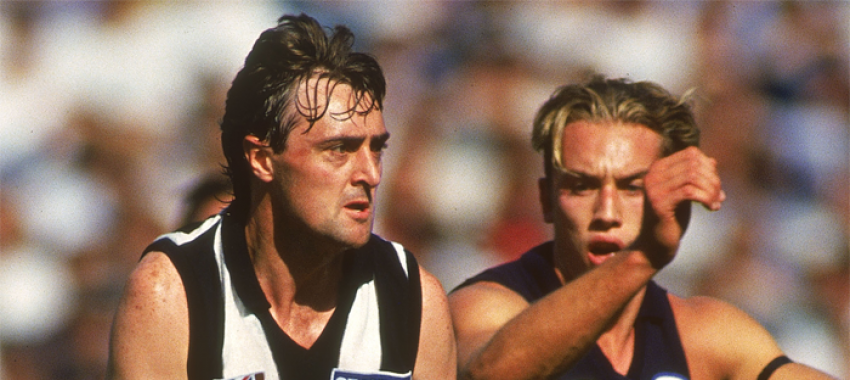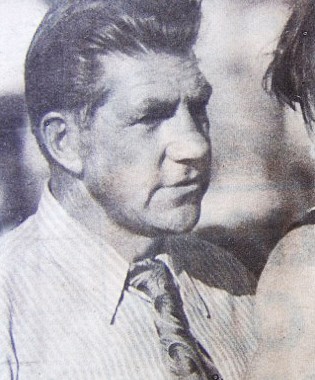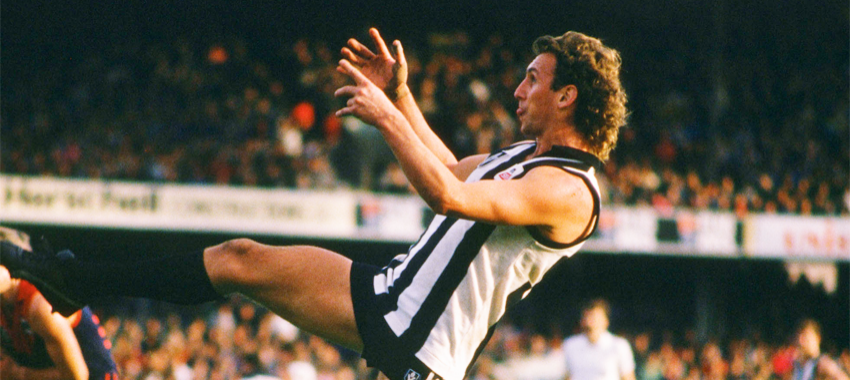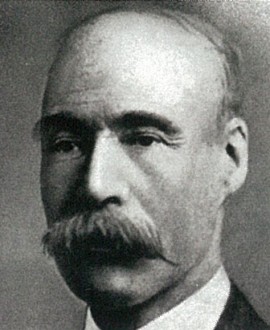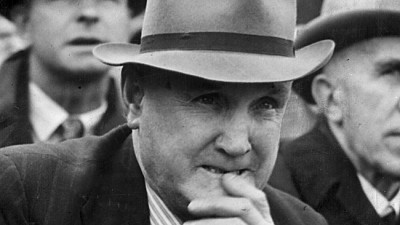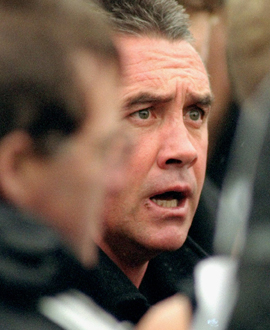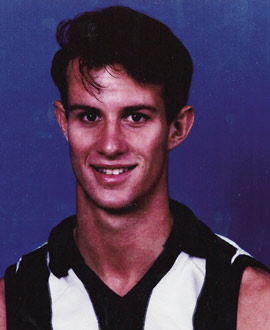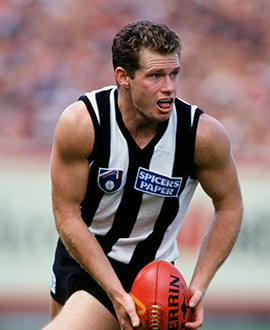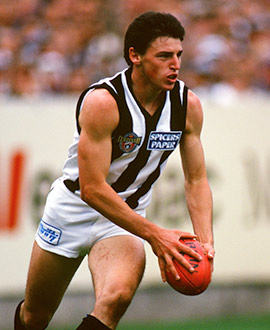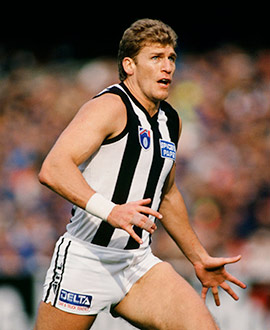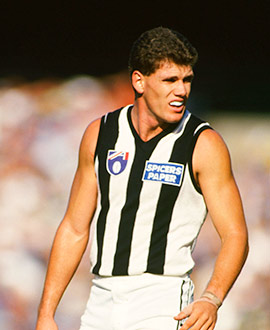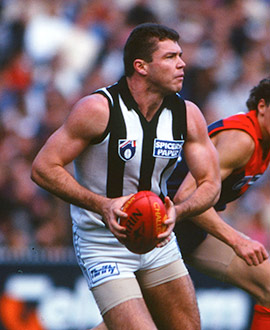By: Glenn McFarlane
Mick McGuane's football career could never be defined by 19 seconds of football.
As exhilarating as they were and as enduring as they remain almost 20 years on, that's never going to happen when you are a Collingwood footballer whose CV includes back-to-back Copeland Trophies, a key role in the 1990 flag side and recognition as one of the Magpie Army's favourite sons for his cheeky nature and his footy smarts.
But if you ask anyone about what they recall the most about McGuane's 152 games in black and white, most will instantly nominate what he did on Easter Monday in April 1994 when he scored one of the AFL's greatest goals.
McGuane's seven-bounce goal in the round two blockbuster against Carlton at the MCG will always be recalled whenever the two teams meet.
The reason it was so memorable was not simply because it came on the biggest of AFL stages or the fact that it came before 85,603 fans who roared with such a ferocity that one club official that day said it was the loudest he had ever heard.
In truth, it was the sheer audacity of the moment. In all it took just under 20 seconds from the time the Sherrin landed in McGuane's hands until the time he slotted it through the Magpie goals at the Punt Rd end of the ground.
McGuane was 26, into his eighth season and playing his 115th AFL when he ran out onto the MCG that April afternoon.
He would leave it with three Brownlow Medal votes for a superb job on Greg Williams, three goals and an amazing moment for his highlights reel.
Even before McGuane's goal, there was an air of expectation sweeping through the Collingwood section of the crowd.
Peter Daicos, a Magpie champion revered for his capacity to make the impossible seem more than likely, had retired the previous season, but he was afforded an emotional pre-game farewell in a motorcade around the packed MCG that day.
But when the two old bitter rivals got down to business, it appeared to be Carlton who settled down the better.
The Blues had five 30-year-old-plus players and a total games experience of 2109. The Magpies had no 30-plus players and a total of 1337 games played.
McGuane was one of five Magpies to have played 100 games or more - along with Gavin Brown (now a Carlton assistant coach), Gary Pert (now Collingwood chief executive), Michael Christian and Gavin Crosisca. The Blues had double that figure.
Collingwood had eight 21-and-under players - Nathan Buckley (in his second game for the club), Sav Rocca, Paul Williams, Shane Watson, Jason McCartney, Kent Butcher, Jon Hassall and Brett James.
Carlton had a minor edge in the opening term, leading by six points at quarter-time, and maintained an advantage for much of the second term.
Then came the moment that changed the context of the match - at the 22nd minute of the second quarter, only four minutes and 35 seconds of game time before half-time when the Blues lead by eight points.
It started almost from nothing. A centre ball-up contested by Damian Monkhorst and Justin Madden that saw the Magpie ruckman grab the ball, and offer up a handball to the closest player in black and white he could find.
It happened to be McGuane.
As the Collingwood midfielder gathered the ball and edged his way past Fraser Brown, Channel Seven commentator Ian Robertson sensed that the Magpies were making a charge.
Robertson said: "McGuane gets past Brown, they're lifting the Pies, they can sense it. The first 15 minutes (they were) ordinary, but since they've been good."
Having evaded Brown, McGuane took his first two bounces as he worked to make his way out of the centre square in a mad dash to the outer wing.
It was here that Mark Fraser came into the picture. He came within a few metres of the zig-zagging McGuane and the man who chasing him, Brown. Fraser laid a near perfect shepherd.
It allowed McGuane the chance to find space. It was enough to allow him to take a third, fourth and fifth bounce as he streamed towards Collingwood's attacking zone.
McGuane would later say: One of the boys said Mark Fraser made two or three good shepherds in that particular passage so it must have been a great effort by him."
Robertson continued his commentary: "McGuane's had five bounces, he could nearly get another one." He did. The sixth bounce came on the 50m line.
As McGuane pushed deeper forward, he was confronted by Blues defender Michael Sexton. Instead of trying to give it off to a teammate, he backed himself to keep going. He feigned, baulked and went on to take a seventh and final bounce.
Aided by a shepherd from teammate Saverio Rocca, McGuane steamed in - his chest heaving but his legs still pumping - and slotted the goal through to the raucous approval of the fans.
As he did, Robertson screamed: "Phil Manassa." His co-commentator Peter Landy chipped in with: "Goal of the Year…Gabbo (Ray Gabelich) would have loved it. Phil Manassa would have loved it."
Manassa and Gabelich had kicked famous goals for Collingwood in losing Grand Finals. McGuane's goal wasn't in a Grand Final, but it was unforgettable as an individual moment.
Incredibly, McGuane had taken as many bounces as Manassa and Gabelich did collectively in their runs.
Manassa took four bounces (with one baulk) in his mad dash down the MCG wing in the losing 1977 Grand Final, while Gabelich had three in his heart-thumping, wild run in the losing 1964 Grand Final.
McGuane's goal clearly lifted his team. As the clock clicked down to half-time, the Magpies were able to level the scores and proceeded to kick six goals to one in the third term.
By the end of the game, Collingwood had won by 34 points.
McGuane would later explain: "I can't remember how I got it, it just fell in my path."
"I saw a space to run to and as I ran to the left hand side I saw there was more space to run in.
"I heard the whistle go, but I didn't hear a double whistle and I didn't know whether it was an infringement…so I just kept running at goal."
"Then I saw Mick Sexton come at me. I backed myself to get around him, I ran across the 50m line, there was no one 'on' so I went straight for goal."
When the umpires came to lodge their Brownlow Medal votes at the end of the game, they had little hesitation in putting forward McGuane's name for his 23-touch, three-goal game.
Fast forward two-and-a-half years, and McGuane's performance that day, and against Carlton throughout his time in black and white, played a key role in the Blues' decision to chase him during the 1996 trade period.
McGuane had been frustrated that Collingwood would not commit to a two-year contract for him at the end of the 1996 season, in which he played only five games due to injury. So he sought a move and the Blues were keen to have him.
Years later, then coach Tony Shaw said he believed at the time that McGuane was never going to reach the same heights as he had earlier in his career due to injury, but he wanted to "allow Carlton to find (that) out the hard way."
The Blues did. McGuane could only manage three games in navy Blue, wearing the No.31 instead of his customary 34 from his Collingwood days. He was even embroiled in a controversy when he had a fight with Matthew Hogg one day when he turned up to training in an unfit state.
McGuane's final game of AFL football came in Round 3, 1997, for Carlton against Adelaide at Princes Park.
That game is remembered as the day the club wore blue M&M jumpers, more than the groin injury that ended McGuane's AFL career.
That three-game Carlton addendum to McGuane's career is best forgotten.
Collingwood fans prefer to remember the good times - and there were plenty of them - when Mick McGuane lit up the stage in the black and white like he did that day in 1994.
